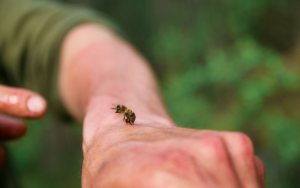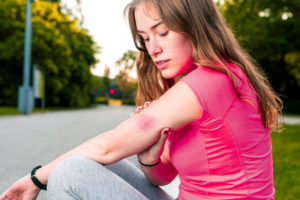Bee sting allergies affect roughly 7% percent of people.4 If you’re one of the 7%, you may only experience a moderate bee sting allergic reaction. However, allergic reactions can rapidly escalate and become deadly. So, it’s crucial to recognize the symptoms.
Common Bee Sting Symptoms
Bee stings are common, especially if you spend plenty of time outdoors. The minor and inconvenient symptoms you may experience at the sting site are:
- Burning
- Slight swelling
- A red welt
While these symptoms may be painful, they will most likely resolve in a few hours. Care for this injury as you would any other minor burn or scrape at home.
Moderate Bee Sting Allergic Reaction Symptoms
Sometimes, people who are stung by bees and other insects have a more intense reaction. If you have a moderate bee sting allergy, you may experience:
- Reasonable swelling at the sting site
- Itchy and watery eyes
- Runny nose
- Rash
While you may not need to see a doctor to treat your moderate reaction, a follow-up visit is a good idea. Bee sting reactions can become more severe each time. What was a mild response may become an emergency with your next sting. A medical provider can determine how allergic you are to bees and what preventative steps you can take.
SEVERE BEE STING ALLERGIC REACTION SYMPTOMS
Sometimes exposure to an allergen results in a serious and potentially deadly reaction known as anaphylaxis. At least 60 deaths occur each year in the United States due to bee sting anaphylaxis.2 Symptoms occur suddenly and should be addressed quickly. Early signs may be minor, including a runny nose, skin rash, or malaise (general uneasiness).
More serious symptoms include:
- Trouble breathing
- Hives or swelling
- Tightness of the throat
- Hoarse voice
- Nausea
- Vomiting
- Abdominal pain
- Diarrhea
- Dizziness
- Fainting
- Low blood pressure
- Rapid heartbeat
- Cardiac arrest
It’s also important to remember that a severe bee sting allergy can occur immediately or appear up to 12 hours after a sting occurs. Observe your symptoms.
WHAT TO DO IF YOU EXPERIENCE A SEVERE ALLERGIC REACTION
What should you do if you have these severe bee sting symptoms?
Call 911 or a local emergency number. Then, use your epinephrine auto-injector if you have one. Do not lay your head down on a pillow if you have trouble breathing. Doing so could block your airway. According to the Mayo Clinic, an antihistamine pill, such as diphenhydramine (Benadryl), isn’t sufficient to treat anaphylaxis because it works too slowly.
If this is the first time you’ve reacted like this, it’s vital to follow-up with an allergist who can help identify your triggers and manage your condition. With their help, you can create both a preventative and reactive plan of treatment.





